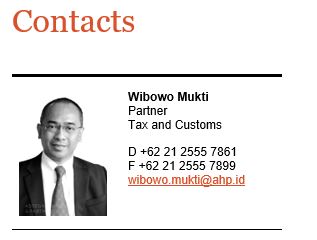Active Income Excluded from the Calculation of Deemed Dividends under the Controlled Foreign Company Rules
With the intention to encourage transparency, provide legal certainty and fairness in the imposition of tax to Indonesian resident taxpayers for its equity participation in a foreign business entity other than business entities listed on a foreign stock exchange, the Ministry of Finance recently amended the Minister of Finance Regulation No. 107/PMK.03/2017 (“2017 CFC Rules“) by issuing the Minister of Finance Regulation No. 93/PMK.03/2019 on Controlled Foreign Company (CFC) Rules (“New CFC Rules“). The New CFC Rules will apply for the 2019 fiscal year.
The New CFC Rules reflects the exclusion of active income and provides a definition for ‘certain income’ (penghasilan tertentu) from the calculation of deemed dividends for a directly and indirectly owned CFC, which includes:
- dividends, except for dividends received and/or obtained from a directly owned CFC;
- interests, except for interests received and/or obtained by a directly-owned CFC that is owned by a resident taxpayer holding a banking business license, which excludes interests received and/or obtained from a direct or indirect transaction between the CFC and the resident taxpayers as the related party in accordance with the Indonesian Income Tax Law;
- rentals in the form of:
- rentals received and/or obtained by a directly owned CFC in relation to the utilisation of land and/or building; and
- any other rentals received and/or obtained by a directly owned CFC originating from a transaction with any other related party in accordance with the Indonesian Income Tax Law;
- royalties; and
- profits from sales or transfer of assets.
Further, the New CFC Rules provides a new guidance to determine the basis for deemed dividends, which is the net profits after tax on certain income and is calculated as follows:
minus
the costs of obtaining, collecting and maintaining certain income
minus
the portion of income tax payable, paid or withheld on certain income
equal
Net Profits after tax on certain income.
This is different from the 2017 CFC Rules, where the basis for deemed dividends is calculated from the total net profits after tax of the CFC (total net profit being active and passive income of the CFC).
We note that the remaining provisions under the 2017 CFC Rules remain effective, including the imposition of deemed dividends from an indirectly owned CFC.
In conclusion, the New CFC Rules requires the CFCs to invest their business in active business activities rather than business activities where the CFCs do not materially participate in.

***
AHP Client Alert is a publication of Assegaf Hamzah & Partners. It brings an overview of selected Indonesian laws and regulations to the attention of clients but is not intended to be viewed or relied upon as legal advice. Clients should seek advice of qualified Indonesian legal practitioners with respect to the precise effect of the laws and regulations referred to in AHP Client Alert. Whilst care has been taken in the preparation of AHP Client Alert, no warranty is given as to the accuracy of the information it contains and no liability is accepted for any statement, opinion, error or omission.

